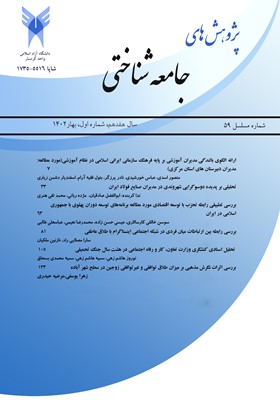بررسی اثرات نگرش مذهبی بر میزان طلاق توافقی و غیرتوافقی زوجین در سطح شهر آباده
محورهای موضوعی : در این فصلنامه موضوعات جامعه شناختی در اولویت چاپ هستند و موضوعات نزدیک به جامعه شناسی در اولویتهای بعد قرار می گیرند
1 - کارشناسی ارشد گروه علوم تربیتی، واحد آباده، دانشگاه آزاد اسلامی، آباده، ایران
2 - استادیار گروه علوم تربیتی، واحد آباده، دانشگاه آزاد اسلامی، آباده، ایران
کلید واژه:
چکیده مقاله :
هدف از انجام این پژوهش، بررسی اثرات نگرش مذهبی بر میزان طلاق توافقی و غیرتوافقی زوجین بوده است. روش پژوهش، علی- مقایسهای و جامعه آماری شامل زوجین متقاضی طلاق توافقی و طلاق غیر توافقی مراجعهکننده به دادگاههای خانواده و مراکز مشاوره خانواده در شهر آباده بودند که 15 زوج متقاضی طلاق توافقی و 15زوج متقاضی طلاق غیرتوافقی با روش نمونهگیری هدفمند انتخاب شدند. جهت گردآوری اطلاعات از پرسشنامه 15 گویه ای نگرشهای مذهبی خدایاری فرد و همکاران (1383) با 2 بعد پررنگ شدن نقش دین و کمرنگ شدن نقش دین در زندگی استفاده شد. روایی محتوایی پرسش نامه توسط تعدادی از اساتید علوم تربیتی و پایایی پرسش نامه با استفاده از ضریب آلفای کرونباخ مورد بررسی و تائید قرار گرفت. جهت تجزیهوتحلیل دادهها از آزمون میانگین دو جامعه مستقل با استفاده از نرم افزار SPSS استفاده شد. یافتههای پژوهش نشان داد که تفاوت معناداری بین زوجین متقاضی طلاق توافقی و غیرتوافقی در نگرشهای مذهبی آنان ( پر رنگ شدن نقش دین و کم رنگ شدن نقش دین ) وجود دارد.
The difference in the rate of consensual and non-consensual divorce, as well as the effectiveness of various indicators, especially religious attitudes, are important issues that have been paid attention to in recent years. In this regard, the purpose of this research is to investigate the effects of religious attitudes on the rate of divorce. It was consensual and non-consensual. The research method was causal-comparative and the statistical population included couples applying for consensual divorce and non-consensual divorce referring to family courts and family counseling centers in Abadah city, 15 couples applying for consensual divorce and 15 couples applying for non-consensual divorce were selected by targeted sampling. The tool used to collect the required information was the 15-item religious attitudes questionnaire of Khodayari Fard et al. (2013) with 2 dimensions of emphasizing the role of religion and diminishing the role of religion in life. The content validity of the questionnaire was checked and confirmed by a number of professors of educational sciences and the reliability of the questionnaire using Cronbach's alpha coefficient. To analyze the required data, the mean test of two independent populations was used using SPSS software. The findings of the research showed that there was a significant difference between consensual and non-consensual divorce couples in religious attitudes, including increasing the role of religion and decreasing the role of religion.
_||_


